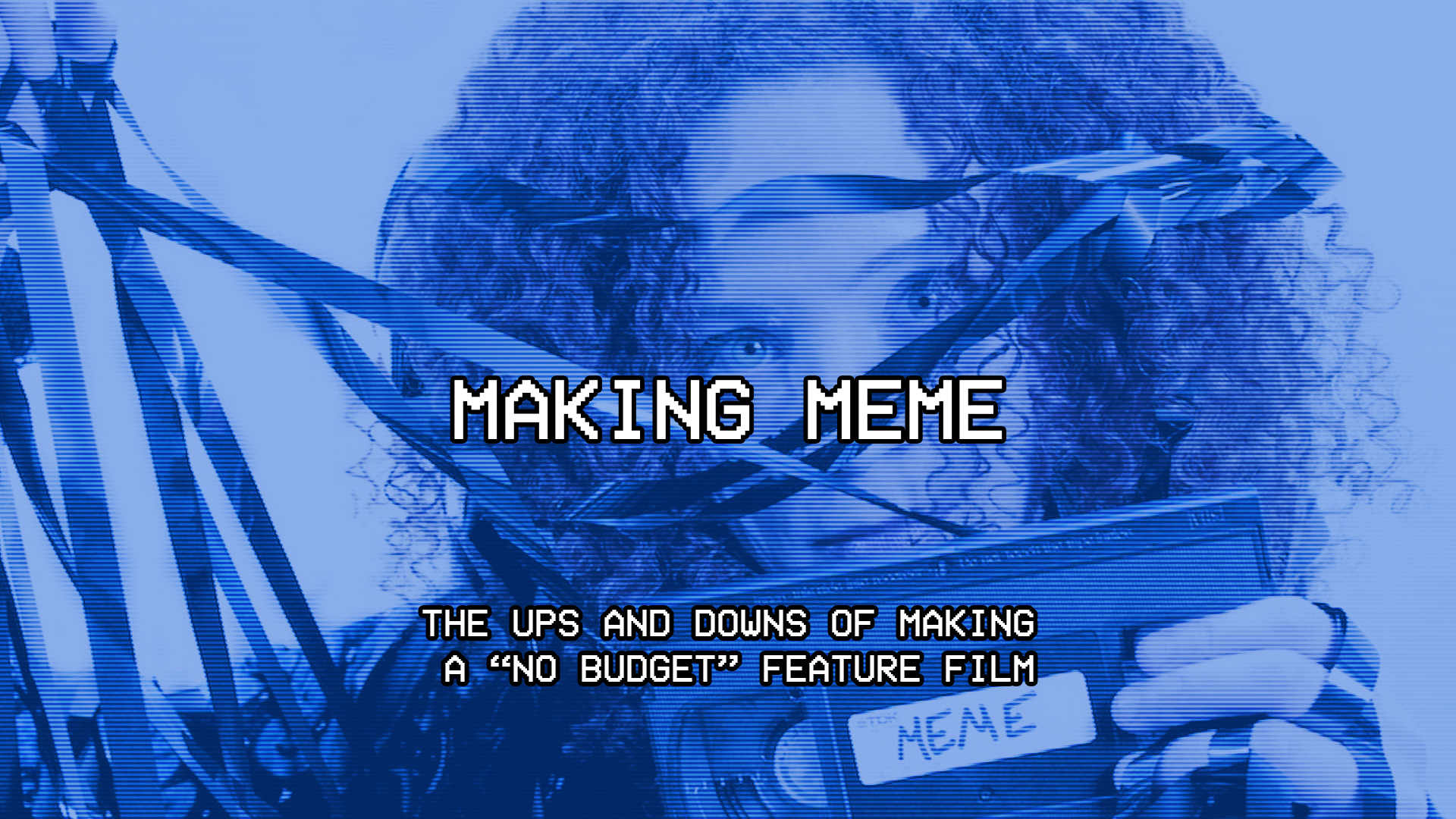Meme is Now Available to Watch on AppleTV, Amazon, and from 4MileCircus
“Making Meme” is a series of blog posts about the long process of taking a project from an idea to a completed feature film. I made a lot of mistakes on the way and learned a lot of lessons, but I also had a lot of fun and got to work with a lot of wonderful people throughout the process. These posts are presented in the hopes of helping others in their struggles to make a film. – Sean Mannion, Writer/Director, Meme
Read this series in order from the beginning
Carolyn Maher joining Meme was the first step to the film actually getting shot. She had been a vital part of making “Time Signature” and keeping me sane on set. She was a great asset. When she agreed to join Meme, I was thrilled.
The first thing we started working on with Meme after Carolyn agreed to join the project was rewrites. Carolyn had some excellent feedback and questions that helped make the story better. Much of the focus for me in rewriting the script was to simplify the film and make it easier to shoot on a tighter budget than the previously planned (already tight) budget. We were going to shoot it “no budget” now.
“No budget” is a bit of a misnomer. There’s no such thing as shooting on no budget. Not in reality. Someone spent money at some point for everything. Money needs to get spent on transportation, food, and those props or set decorations you can’t just borrow. No budget generally means asking for a lot of favors and working around schedules and restrictions that might otherwise be solved by paying people. Crowdfunding is tough. Getting any funding for a project is a tough road. No budget is just trading that work and those problems for different problems and different work. So, the decision to make Meme on no budget wasn’t something that made it easier, just different.
Carolyn was a huge part of making the project work. Her day job with a Brooklyn production company, One Glass Video, was essential to making Meme. Her boss generously allowed us to borrow their equipment for the shoot as long as they weren’t using it. This gave us access to cameras, lenses, lights, sound equipment, and other resources. This was vital to making the project “no budget,” but also underscores what I was saying about no budget being a misnomer. We didn’t spend the money on the equipment but One Glass Video had certainly spent quite a bit on it. We were fortunate to have their support.
When discussing no budget I think it bears mentioning that I personally owe everyone who lent a hand even for part of a day my own time and/or work in return for their contribution of time and talent. Some people I don’t think I’ll ever be able to really give in return what they gave, others I hope I can do enough to make them feel like the scales are balanced. Filmmaking is a big endeavor. It requires a lot of hands even with a small cast and crew. I owe at least some small debt to everyone credited on the film and some who aren’t.
This is also where I think that “no budget” gives a false impression. I was fortunate to work with very talented and very professional filmmakers in front of and behind the camera for Meme. They essentially donated their day rates to the project. The main thing I attempted to do for them in return is to do what I could to make it smooth and make them feel like I appreciated them being there. Hopefully, I was successful at that more days than I wasn’t.
One small way I tried to make people feel appreciated, that I’d encourage others looking at “no budget” filmmaking to consider, is I tried to take care with craft services for the shoot days. My main way of doing that was to personally make the lunch/dinner for the shoot days. Usually, this took the shape of making a variety of sandwiches for everyone. Many times on the day before a shoot weekend, I would camp out in my living room with a variety of sandwich making items and watch a movie and put together sometimes dozens of sandwiches. If someone, like our DP Peter, mentioned they like to have something on hand–like baby carrots–I tried to make sure we provided that most days. The two-fold advantage of paying attention to this is that people tend to appreciate that you took the time to make them something instead of ordering or catering the day and it costs as much to make the food for a whole weekend as it does to put in a food order for a whole cast and crew for a single meal. It takes time to do it ahead of the shoot but saves time on set and saves hundreds of dollars. Plus, you don’t have to go cheap on ingredients. Buy the expensive cheese, meat, spreads, breads, and so on. You’re still saving a lot of money and feeding your team better than if you ordered some pizzas.
As a director there is a certain calming of nerves that comes with doing meals prep ahead of a shoot weekend as well. It’s stressful work making a movie, but making those sandwiches sometimes helped me relax a little ahead of those days. Not that I was always able to stay relaxed on the days, but we’ll touch on that further down the line.
Knowing we were going to shoot on no budget and with access to equipment from One Glass Video we began the pre-production process for shooting Meme.
In the next post I’ll review the pre-production process for the film and our initial preparation.

